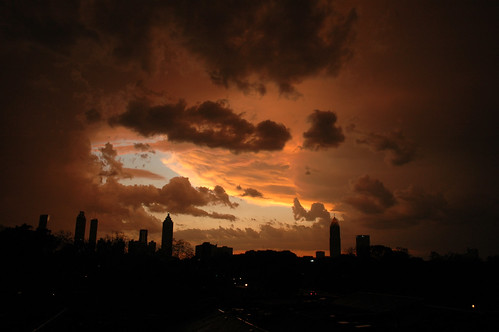 |
| Photo by Clinton Steeds |
Atheists are a diverse bunch, and we come to atheism in many different ways. Some are life-long atheists who were never subjected to any form of religious indoctrination; others had to go through a lengthy process of discarding the belief system into which they had been raised. Individual variations aside, there is at least one pattern that I have seen often enough to suspect that there may be something to it.
For many of us who were raised as religious believers and go through a period of questioning our beliefs to eventually recognize that we no longer believe (i.e., we are atheists), something fairly predictable seems to happen. We experience a sensation of being "strangers in a strange land." We look around at our religious neighbors and feel different in many ways. What was once familiar to us now seems quite odd. We turn to one another and ask, "How could anybody still believe this stuff?" We may become obsessed with The Matrix and how we are seeing the world for what it is now that we are no longer plugged in. We become aware of religious privilege, church-state violations, and the countless ways in which religiously-based laws restrict our rights and cause harm in the world.
The outcome of such experiences, understandably, is that we devote some of our time and energy toward the goal of reconciling our atheism with our religious surroundings. "As an atheist, what is my place in this religious society?" "What can I do to reduce the destructive power of religion?" Many of us take it upon ourselves to do something to protect the separation of church and state, promote atheist civil rights, or participate in various forms of secular activism. We join secular organizations, start reading (or writing) atheist blogs, listening to atheist podcasts, watching atheist videos, and reading atheist books. We are excited to learn about the long and distinguished history of atheism, and we seek to connect with other atheists who share at least some small portion of our experience.
For many atheists, this period is one of intense passion. We feel like we are finally understanding the true nature of the world, confronting the many injustices for which religion is responsible, recognizing that we are not alone in our desire to bring about change. Many atheists do end up making meaningful contributions here (e.g., creating content for the dynamic secular communities, reaching out to others trapped in difficult situations, engaging in church-state activism).
After a few years have passed, many atheists find themselves feeling burned out, disillusioned, or simply bored. Much of the change we sought did not happen. We are still surrounded by religious believers, our legislatures continue to restrict our rights based on religious dogma, and we cannot help noticing that a growing number of our atheist colleagues seem to be acting like petulant children on the Internet. It seems like we are saying the same things over and over, and it would be nice to change things up a bit. We begin to ask questions of ourselves that do not have easy answers. "Okay, so I'm an atheist. Now what?" "I'm an atheist, but what do I really stand for?" "I'm an atheist, but what do I really want out of life?"
I find nothing wrong with asking these questions, and I have certainly been asking my fair share. I regard asking them as a normal, healthy part of the developmental process. We just need to recognize that there will be many different answers and try to be okay with that. We need to answer these questions for ourselves; it would be silly to presume to answer them for others.
For some atheists, the answers to these questions lie in something other than atheism. Secular humanism, social justice, and even Atheism+ come to mind as popular examples. For other atheists, the questions seem to miss the point somehow. Perhaps they are still perfectly content with a narrowly defined traditional sort of atheism. Maybe they never regarded atheism as a central part of their identity and have always been many things other than atheists. There is no one right answer here that will satisfy everyone, and we should not be surprised by that. Without dogma or "holy" books of our own, there are some questions that we will need to answer for ourselves.
Where we seem to get ourselves in trouble is not that we are asking these questions or with our answers; what gets us in trouble is with our tendency to condemn those whose answers differ from ours. But others are going to have different answers to these questions, and this does not make them crazy, stupid, or wrong. How one answers these questions reflects one's priorities and the aspects of one's identity one is trying to cultivate. We have to expect that people will differ in how they do this, and think how dismal the world would be if they did not.
I do not yet have a satisfactory answer for myself. Maybe I never will. And you know what? I am starting to be okay with that possibility.